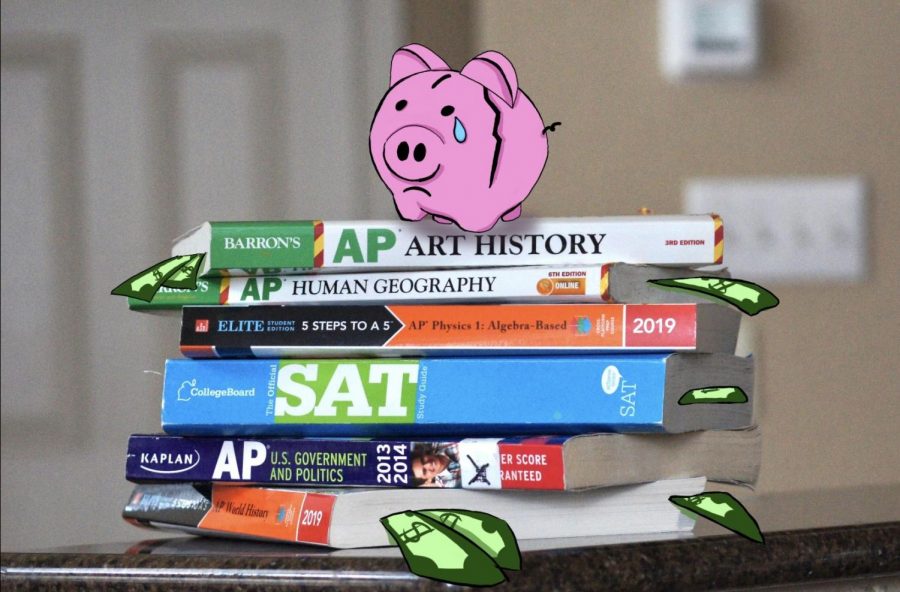Education has become an inequitable business
Colleges have progressively become more inequitable for students, leaving them and their families in debt. The Sidekick staff writer Nanditha Nagavishnu explains how in light of COVID-19, this issue has become more apparent.
December 1, 2020
Decades after the Title IV of the Civil Rights Act prohibiting discrimination in public schools and higher education based on religion, race or national origin, education continues to be elusive and disadvantegeous to students who are not financially privileged.
In 1983, when the US News & World Report started publishing college rankings and using SAT and ACT scores as a factor, colleges fighting for prestige and elitism admitted students with the highest scores. Colleges continue to consider the scores as an objective way to assess student capability, though they have potential to be favorable for high-income family students.
“If you look around, [SAT test prep classes] are what a lot of people are trying to sell you,” Coppell High School testing coordinator Dr. Rachelle Hill said. “In reality, especially in the public school sector, you can get that stuff for free, all you have to do is just ask for it. If you pay [some number of] dollars, you’re going to go to the classes and do all the assignments. [Companies] know that and they take advantage of that.”
With the hindrances COVID-19 has imposed on testing, more than 400 colleges have gone test-optional, making including scores with applications optional. Regardless, determined students and families have been unwavering, some who are privileged enough travelling across states to ensure they have the chance to take the SAT/ACT. For students, the common wisdom is it would give an edge in applications because universities are not enforcing test-blind policies instead, which would nullify standardized test scores. With this move, colleges have created a hazy system that confuses students on whether or not it is advantageous to take the tests.
If it is possible to assess students’ merits without a standardized test score, why not completely do away with it?
“Test-optional [is vague],” CHS senior Tony Shi said. “People will still sign up for them because they want to get the score that’ll make them stand out.”
Trust in our admissions and institutions is important. The Varsity Blues case in 2019 saw various celebrity and elite parents paying the operation organizer, Rick Singer, to influence their childrens’ admissions in prestigious colleges. Singer would bribe coaches to admit students as recruited athletes or pay test moderators to change a student’s SAT/ACT score. This scandal displayed the decreased integrity of higher education.
In the heat of this scandal, former University of Southern California student Olivia Jade, in a now deleted YouTube video said, “I don’t know how much of school I’m going to attend, but I’m going to go in and talk to my deans and everyone and hope that I can try to balance it all. But I do want the experience of game days, partying – I don’t really care about school, as [my subscribers] all know.”
The fact that students like Jade got spots in accredited universities they didn’t want because of economic privilege shows how higher education’s priorities can slowly crumble under profits and corruption, and how change starts from people on both sides of admissions.
With easily accessible federal and private student loans, colleges have the freedom to concentrate on getting national recognition and prestige. Universities do not need to lower costs to ensure more applicants since their revenue is guaranteed by secure tuition loans. This means a leniency to cut federal funds since universities get most of their money from tuition and fees. For students, though, this means a conventional education comes with higher debts.
The pandemic has shed a light on this issue. A number of Texas public schools, such as Texas A&M, University of Texas at Austin and Texas Tech, offer a percentage of courses online. Universities are wary to go completely online since it might reduce needed income generated by amenities like student housing. It also holds the threat of students joining another university for the availability of in-person classes, which would risk income from tuition fees. We can always blame universities for being too focused on economic profits, but we should acknowledge this stems from their lack of safe funding and the supposed prestige attached to higher tuition fees.
Out of colleges offering in-person classes, only 25 percent are conducting mass or random COVID-19 testing. Only six percent regularly test all students. For the colleges that are already suffering financially, the cost of tens of thousands of tests, even with aids and partnerships, is too much.
Nationwide, undergraduate enrollment has dropped in nonprofit universities and grown in for-profit ones, most likely due to the flexibility and accessibility their online classes offer. In Texas, 60.5 percent of for-profit students are low-income. They are less likely to graduate and more likely to take on student loans and collect college debt compared to students in nonprofits, a consequence of the poor educational quality at these colleges. Lower-income students may attend these colleges for proximity to their homes, convenience and their less selective admissions.
For-profit colleges target these students with promises of financial stability and successful careers, which often don’t materialize because of their low federal funding and stingy spending on student instruction. For these students, college was just a means to an end.
Some economically privileged students are allowed to be indifferent to education because of the security their money entails, while students from lower-income families may not even get the chance to appreciate education. This manifests from the lost integrity of higher education; is it merely a business with the sole purpose of providing a degree? Maybe not yet, but it is destined to be if we continue with these priorities.
“It’s unfortunate that we have to [discuss] this in the first place,” CHS English teacher Alex Holmes said. “Education is one of those things we sometimes leave out in our human rights. Everyone desires to learn, everyone desires to improve themselves and the fact that there’s a certain price tag associated with it is upsetting and unfortunate. [It is troubling] for students who feel like they’re being cheated out of a system that was made for them.”
Follow Nanditha Nagavishnu (@nanditha__n) and @CHSCampusNews on Twitter.











